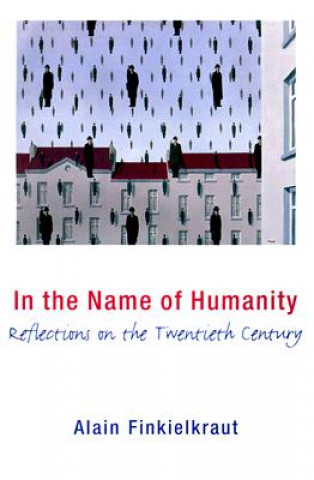
Kód: 04557341
In the Name of Humanity
Autor Alain Finkielkraut
The notion that all the world's peoples constitute a "brotherhood of man" is not a given among all human beings -- it is rather the product of history. So suggests acclaimed philosopher Alain Finkielkraut in In the Name of Humani ... celý popis
- Jazyk:
 Angličtina
Angličtina - Vazba: Pevná
- Počet stran: 128
Nakladatelství: Columbia University Press, 2000
- Více informací o knize

1966 Kč

Skladem u dodavatele v malém množství
Odesíláme za 10-14 dnů
Potřebujete více kusů?Máte-li zájem o více kusů, prověřte, prosím, nejprve dostupnost titulu na naši zákaznické podpoře.
Přidat mezi přání
Mohlo by se vám také líbit
-

Dune
217 Kč -

Haunting Adeline
620 Kč -

Berserk Deluxe Volume 2
1092 Kč -

White Nights
90 Kč -

Powerless
291 Kč -

Atomic Habits
509 Kč -

Dune Messiah
228 Kč -

Berserk Deluxe Volume 3
1142 Kč -

One Day
218 Kč -

Berserk Deluxe Volume 1
1115 Kč -

Iron Flame
354 Kč -

Surrounded by Idiots
303 Kč -

Harry Potter and the Prisoner of Azkaban (Minalima Edition)
993 Kč -

Gravity Falls Journal 3
440 Kč -

Heaven Official's Blessing: Tian Guan Ci Fu (Novel) Vol. 1
440 Kč -

The Creative Act
550 Kč -

Dune
204 Kč -

Hunting Adeline
642 Kč -

A Little Life
267 Kč -

Children of Dune
230 Kč -

Heaven Official's Blessing: Tian Guan Ci Fu (Novel) Vol. 2
479 Kč
Darujte tuto knihu ještě dnes
- Objednejte knihu a zvolte Zaslat jako dárek.
- Obratem obdržíte darovací poukaz na knihu, který můžete ihned předat obdarovanému.
- Knihu zašleme na adresu obdarovaného, o nic se nestaráte.
Více informací o knize In the Name of Humanity
Nákupem získáte 197 bodů
 Anotace knihy
Anotace knihy
The notion that all the world's peoples constitute a "brotherhood of man" is not a given among all human beings -- it is rather the product of history. So suggests acclaimed philosopher Alain Finkielkraut in In the Name of Humanity, an unsettling reflection on the twentieth century in its twilight hours in which he asks us to rethink our assumptions about universalism and humanism. While many people look to humanist ideals as a deterrent to nationalist chauvinism, Finkielkraut challenges the abstract idea of universalism by describing the terrible crimes "civilized" Europe has committed in its name. At the same time as it challenges the inhumanity of our century's great universalistic solutions, In the Name of Humanity also confronts the more onerous elements of unreflective nationalism -- clearly condemning the dangerous use of claims for ethnic purity. However, the book does not put forth a standard-issue polemic against the multitude of nationalistic currents that continue to plague the international arena. Indeed, even as he deplores the violence that seems to go hand in hand with nationalism, Finkielkraut defends its underlying cause -- the need to belong. Eloquently quoting the experiences of refugees from Hitler's Germany, he shows the reader why we must heed the call of this irreducible need. Finkielkraut reminds us that the concept of cultural relativism -- indeed, the very idea of tolerating other cultures -- is a relatively recent development in Western history. As he looks for answers he interrogates the differences between historical racism and the racism embedded in the philosophies of this century's genocidal movements, showing how modern racist ideologies like National Socialism look not to sin within the self as the stumbling block of human advancement but to a clandestine conspiracy by a particular, identifiable element of human society. What this form of radical racist thought eliminates is the notion of personal responsibility -- instead of finding the answers to misfortune within the self, modern racism suggests that evil can be identified in others and summarily eliminated. Lucidly connected to the ideas of past thinkers, from Plato to Levinas to Hannah Arendt, Finkielkraut's latest work is a troubling indictment of our century that refuses to back away from the "messiness" of human life and culture. In his willingness to abjure simple solutions, he offers a glimmer of hope.
 Parametry knihy
Parametry knihy
Zařazení knihy Knihy v angličtině Humanities History History: earliest times to present day
1966 Kč
- Plný název: In the Name of Humanity
- Podnázev: Reflections on the Twentieth Century
- Autor: Alain Finkielkraut
- Jazyk:
 Angličtina
Angličtina - Vazba: Pevná
- Počet stran: 128
- EAN: 9780231110204
- ISBN: 0231110200
- ID: 04557341
- Nakladatelství: Columbia University Press
- Hmotnost: 404 g
- Rozměry: 237 × 161 × 15 mm
- Datum vydání: 10. January 2000
Osobní odběr Praha, Brno a 12903 dalších
Copyright ©2008-24 nejlevnejsi-knihy.cz Všechna práva vyhrazenaSoukromíCookies


 Vrácení do měsíce
Vrácení do měsíce 571 999 099 (8-15.30h)
571 999 099 (8-15.30h)